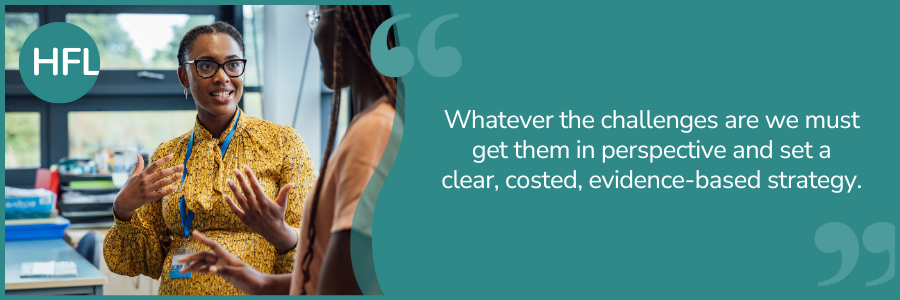
So what challenges are we facing? Balancing budgets, ensuring academic standards and outcomes improve, addressing staff shortages and retention, managing stakeholder expectations, monitoring and ensuring your policy framework is fit for purpose, fostering inclusivity, navigating the wider DfE, Ofsted compliance and governance regulations, ensuring safeguarding is effective, managing staff and leadership wellbeing, monitoring behaviour and attendance – and so much more.
So where to begin? The above should all be considered with short-, medium- and long-term strategies to resolve and manage with actions and KPIs to enable tracking, evidence gathering and measuring the impact of initiatives and support put in place to tackle them. I think to consider each of the above (and all the other unlisted challenges) in isolation risks overwhelming us, the fact is every institution, business, public body, charity in the UK is facing a similar tsunami of challenges. So, it must be a reassurance that ‘we are all in this together’ and that schools are not uniquely impacted. As a board, every governor whether in their work, social or family life will be dealing with similar things and therefore can bring this experience and the strategies to overcome many of them to the table. It’s vital then to tap into that lived experience and resource, discuss and agree what will help your school, and what won’t, and get applying that lived experience and evidenced knowledge to bear down on the challenges working with school leaders and other stakeholders.
It's not really a stretch to say that for the past 20 years the above challenges have been faced by schools to a greater or lesser extent, this can only help with where we are now. Tapping into the knowledge of longstanding headteachers (sharing challenges they have faced, addressed & overcome), experienced governors & members of staff (maybe those that have retired as well), volunteers, suppliers and members of the local business and wider community could provide much needed support and answers to today’s challenges. Maybe hold some focus group style meetings with these stakeholders to distil out how they approached and resolved the challenges they faced or invite them to attend a board meeting to contribute at a focussed session. Equally minutes and papers from meetings of yesteryear may provide nuggets of best practice.
I think we feel the weight of responsibility too heavily at times, that we become siloed in our schools feeling that the draw bridge has been pulled up and it’s us against the world. The fact is that there’s a wealth of support out there to help mitigate and resolve these challenges. This comes nationally from the DfE, Ofsted, Ofqual and our LAs who all hold regular briefings and webinars to update school leaders and governors/ trustees alike - ok this may not be up there with a quiet night in but they genuinely are framed to support and improve practice! Next are organisations such as National Governors Association, Confederation of School Trusts and of course HFL Education (excuse the plug!). Organisations such as these have a long and rich history of supporting governance with training, briefings, bulletins, thought pieces, blogs that are solely aimed at providing governors, trustees and their boards with both generic and bespoke support. Finally, there are the third sector providers such as the NSPCC, Education Endowment Foundation, School Home Support or National Federation for Education Research who can provide much research-based evidence to support schools when planning strategies and policy to particularly support the underserved, SEND and Pupil Premium pupils.
Depending where you find yourself on the challenge curve will depend on how much you need to deploy or engage with the range of support ideas above. Whatever the challenges are we must get them in perspective and set a clear, costed, evidence-based strategy with clear key performance indicators to get to the point where at the very least the challenge is managed and at best resolved. There’s a certainty that with many of the educational challenges that schools face that they will at best either be contained, managed, ring fenced or a combination of these. I am mindful of the words of Steve Bartlett (Diary of a CEO) on overcoming challenges:
‘You’re overcomplicating it.
Just start trying.
See what works.
Adapt as you go.
Imperfect action always
beats perfect inaction’.
Does this ring true for your board? If it does it’s far from a criticism, it’s a recognition of where many organisations can end up in difficult times, battening the hatches down, weathering the storm, pulling the levers that have worked in the past and hopefully searching for the proverbial light at the end of the tunnel. There’s nothing gung-ho about this quote, break it down and it’s almost a ‘baby steps’ approach to resolving problems – try things (monitor and evidence the impact), progress with what works (review progress and impact and fund what works), monitor what’s working and tweak and adapt as you go to improve its impact, doing nothing won’t move the dial on anything!
I hope this blog has at least given you pause for thought and at best possibly inspired a new approach and mindset when it comes to the challenges we face as a sector. It’s about perspective and Rome not being built in a day, it’s about pausing and reflecting, it’s about not missing tapping into the vast wealth of experience and resource that our experiences beyond our governor role bring to the table and it’s about thinking that solutions are possible rather than impossible!
We are here to help and support, please don’t hesitate to contact us:
Phone the helpdesk on 01438 544487 or email us at governance@hfleducation.org



